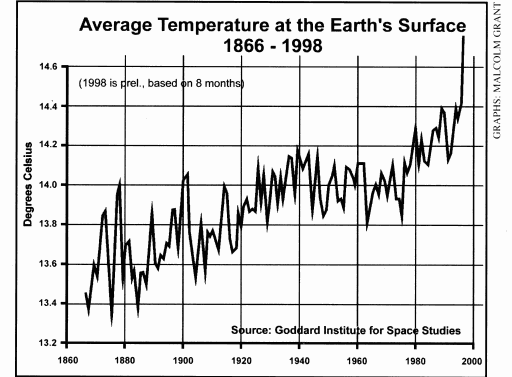| The Effects of Global Warming |
|
Predictions by the IPCC latest coupled ocean-atmosphere models show that, if emissions of greenhouse gases continue to rise on current trends, then greenhouse gas concentrations will reach double pre-industrial levels by 2080. This would produce a global average temperature increase of 2.5oC, with 3oC to 4oC increases over some parts of the Earth, including parts of the Arctic and Antarctic. These temperature rises may seem modest but it should be noted that a 3oC cooling brought on the most recent ice age. The implications of increased global temperatures are immense. With higher temperatures there is more energy driving the Earth's climatic systems, which in turn causes more violent weather events. Severe storms, floods, droughts, dust storms, sea surges, crumbling coastlines, salt water intrusion of ground water, failing crops, dying forests, the inundation of low-lying islands and the spread of endemic diseases such as malaria and dengue fever are all possible effects of global warming. Sea level rise following the melting of the ice caps will affect millions of people, as will increasing desertification and shortage of water. |
| Impacts |
|
| Emissions Scenario | Global Warming wrt 1960-1990 (oC) | Water Shortage (millions) | Coastal Flooding (millions) | Hunger (millions) |
| Do Nothing | 1.39 | 1053 | 23 | 22 |
| Kyoto | 1.33 | 1053 | 22 | 20 |
| 20% Reduction | 1.22 | 909 | 21 | 17 |
| 30% Reduction | 1.19 | 891 | 20 | 16 |
| The evidence that the Earth is warming up comes from Mauna Loa where they have recorded data since 1958. |

|
|
The average temperature of the Earth is increasing at a rate of 0.07oC per decade and although the temperature varies from year to year the general trend is now accepted to be upwards. This temperature rise is a direct result of human activity. Global Warming is now regarded as the principle environmental issue by UK adults according to a 1998 MORI poll, and amongst large businesses it is seen as one of the major environmental impacts. Task:
|